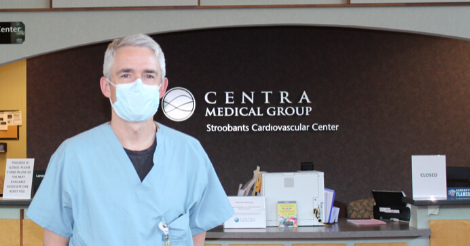Coronavirus & Heart Patients
An interview with Peter K. O'Brien, MD, about recognizing the signs of a heart attack and the relationship between heart disease and the coronavirus. Dr. O'Brien is the Director of the Acute MI Program at CMG Stroobants Cardiovascular Center, Director of the Cardiac Cath Lab at Lynchburg General Hospital, and Co-Chair of the Virginia Heart Attack Coalition. Dr. O'Brien has been at Centra for 19 years.
What are the signs of a heart attack?
Signs and symptoms of a heart attack typically include chest pain or any chest discomfort, which patients will describe as a heaviness, a pressure, tightness, or just a sensation that something is wrong. They also include a shortness of breath, sweating, nausea, extreme sudden fatigue, left arm or shoulder pain, and you can have chest pain with any one of those symptoms or you could have any of those other symptoms in isolation.
No two patients present in exactly the same way and they don't always present like the textbook description of a heart attack.
Are there any different symptoms in men or in women?
We historically had thought that women present differently. According to more recent studies, women do present most commonly with chest pain.
People should bear in mind that it's not as much a male, female thing as it is a younger versus older a difference. In other words, after the age of 80 you're just is likely to get vague feelings of shortness of breath or some of those other symptoms I mentioned as you are chest pain.
However, women are often overlooked though because they're not thought to have the same incidence of heart disease, when in fact they do. This is a misconception among some physicians, patients and families.
Why is it important to treat a heart attack quickly?
As we say in cardiology, time is muscle and time is life.
A heart attack comes from a blockage in a coronary artery and that coronary artery is supposed to be delivering blood, oxygen, nutrients to cardiac muscle. As soon as you turn off that faucet, as soon as you block the flow of that blood, death of that heart tissue starts. It has been well shown that most of the damage occurs in the first 30 to 120 minutes. So the faster you call 911 and get to the hospital the more likely you will survive.
What is Centra doing to prevent COVID infections in the hospitals?
Centra has been very careful in their preparation and ongoing measures to safeguard patients. To be honest, there is the potential for exposure anywhere. But Centra and the emergency department have gone to great lengths to create a safe environment for patients.
If you're having a heart attack, your risk of permanent disability or even death from that heart attack greatly outweighs the risk you're going to be exposed to the virus.
Do people with a history of heart disease have an increased risk of complications from coronavirus?
They do, yes. Patients with heart disease, that is one of the most important predictors of severe illness or even death with COVID. So those patients are vulnerable.
Patients with other chronic conditions, even including obesity, and older patients are also at risk. I was surprised to learn that since I'm 52 I am now considered old by COVID criteria. I am over the age of 50, and we know that age is a strong predictor of outcomes with COVID.
What precautions should heart patients or people with heart disease take to try their best not to contract coronavirus?
Wash your hands, wear a mask, and practice good social distancing. Only go out if necessary.
Any additional advice to increase immunity amidst the COVID crisis?
Absolutely. Take care of yourself, get adequate rest, adequate hydration, eat healthy, it's still okay to exercise, it's one of the few things that seems like you can do. It's important to take care of yourself, to make yourself less vulnerable. The healthier you are, the less vulnerable you'll be.
This is also a reminder that we can't predict when the next pandemic, the next surge in COVID or who knows what virus in the future is going to strike, so it's important to be prepared. Keep yourself as strong, and as physically fit, and as healthy as possible. That includes exercise, maintaining a good body weight, availing yourself of any vaccinations that your doctor recommends, especially the flu vaccine. The next COVID surge, if it comes in the fall, will probably coincide with the usual flu season and that will be a double whammy. So you definitely want to get the flu vaccine if you haven't had that. Do all those things to give yourself the best chance to weather the storm.
Call 9-1-1 if you think you're having a heart attack or a stroke. This will allow the EMS personnel to identify the heart attack or the stroke at your home or in the field, and it will give a much more advanced notification to the team. Your time to treatment for heart attack is greatly reduced by calling 9-1-1 and getting a prehospital EKG.
One last question - if someone is at home with a mild case of COVID, and they believe they are having a have a heart attack, should they let 9-1-1 know that they suspect they have COVID?
Yes, absolutely. We want to protect our EMS providers. It will also help the doctors and nurses that are seeing that patient in the emergency department sort out what's going on. COVID does affect the heart. COVID can actually mimic a heart attack. So it's important to help to provide that information to keep providers safe, but also help appropriately diagnose and treat your condition.

